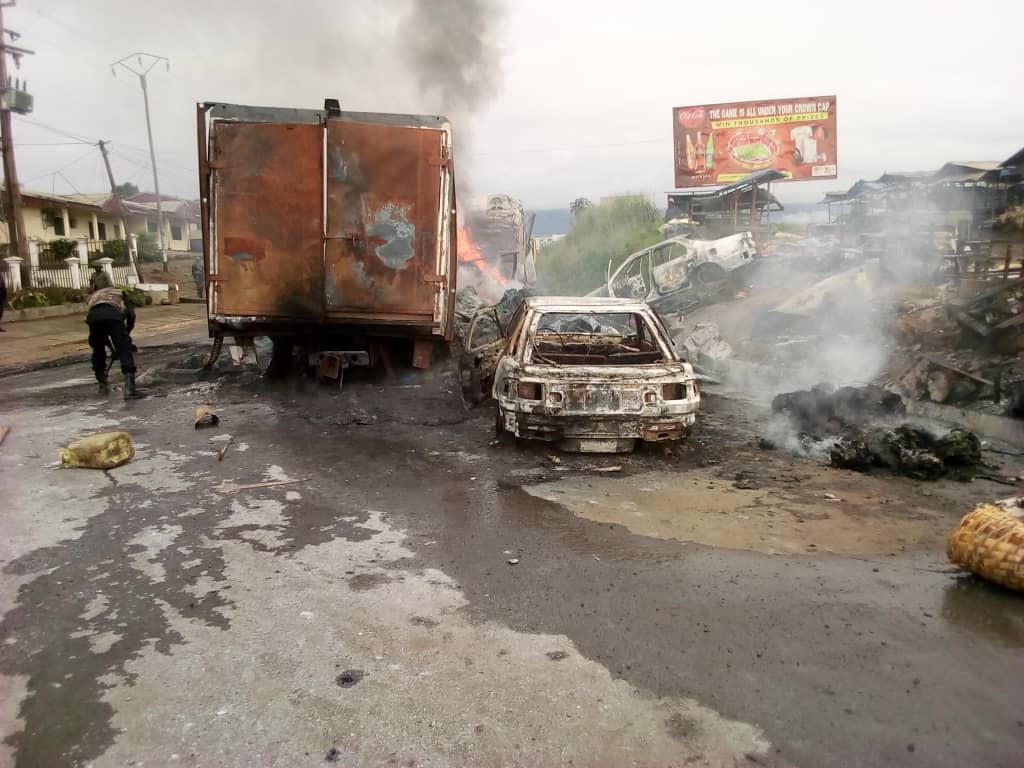YAOUNDÉ, Cameroon – Military parades and civilian march pasts marked the 53rd edition of Cameroon’s National Day on May 20. It’s frequently framed as a day of national unity by the authorities, but that framing rings hollow with millions of citizens in Cameroon’s English-speaking North West and South West regions.
For many in the two regions which constitute 20 percent of Cameroon’s nearly 30 million inhabitants, it’s a stark reminder of betrayal, marginalization, and bloodshed – and that was on full display on Tuesday in several parts of the Anglophone regions.
Images of brute violence surfaced online showing suspected separatists beating up school children who had set out to March.
In Kumbo Diocese – a flashpoint of separatist violence, Bishop George Nkuo told Crux that the town woke up Tuesday to the sound of gunfire and explosions.
“We are celebrating national day in Cameroon today and this morning we got up in Kumbo to gunshots and a heavy explosion,” Nkuo said.
“This again is to announce that all is not well in Cameroon. While some people in Cameroon may be celebrating this morning, we got a strong reminder here that there is no peace and people are living in fear,” he told Crux.
This dates back to May 20, 1972. On that day, a controversial referendum organized by Cameroon’s first president, Ahmadou Ahidjo, scrapped the federal constitution that was the mainstay of a fragile union between La Republique du Cameroun – that gained independence from France in 1960 – and the British Cameroons, which gained independence from Britain a year later.
The resultant unitary state was seen by Anglophone Cameroonians as a violation of the federal constitution, and a step towards the assimilation of Anglophones. And so, what Ahidjo sold as a blueprint for national unity ended up as the seeds of today’s disunity.
For decades, Anglophones complained. They protested, asking for equal treatment under the law, but these complaints were either just ignored, or brutally suppressed.
The pent-up anger burst into the open in 2016 when teachers and lawyers in the two Anglophone regions took to the streets to protest the imposition of French in Anglo-Saxon schools and courts. Again, the government responded by imprisoning the leaders of the teachers and lawyers trade unions, and by using lethal force against protesters.
The door to dialogue was thus shut close, and a separatist uprising ensued, with many taking up arms to fight for the creation of a new state for Anglophone Cameroonians to be called Ambazonia.
Nearly a decade of fighting has left at least 60,500 people dead, and more than a million displaced. Entire villages have been burned down; schools and hospitals have been destroyed.
“Those of us who love this land want to see concrete measures taken to arrest this senseless war,” Nkuo told Crux.
“It’s a cry for peace, justice and reconciliation. Our people have suffered enough. There is no celebration here in Kumbo and there is a deadly silence,” the bishop said.
The government has made some efforts to bring about peace. In 2019, it initiated what it called a Major National Dialogue.
The National Dialogue made a series of proposals, including the adoption of a special status for the two Anglophone regions; the restoration of the House of Traditional Chiefs; the immediate relaunch of certain airport and seaport projects in the two regions; the rapid integration of ex-combatants into society; the deployment of Bilingual teachers to Anglophone schools, and the deployment of Anglophone lawyers to Common Law Courts.
Separatists have dismissed all these concessions as too little, too late, insisting they will continue to fight for the freedom of “Ambazonia.”
It seems like the option for independence resonates with most Anglophone Cameroonians, going by the results of a study carried out in 2019 by the late Cardinal Christian Tumi.
The prominent religious leader conducted a survey before the Grand National Dialogue which revealed that 69 percent of Anglophone respondents expressed a preference for secession rather than federation or decentralization. Interestingly, the questionnaire did not explicitly offer secession as an option, but many respondents wrote it in under “other options.”
President Paul Biya has made it clear that Cameroon will remain “one and indivisible.”
The celebration of the National Day is yet another emphatic statement to that effect.
Archbishop Andrew Nkea, who doesn’t believe that the solution to the Anglophone Problem lies in secession, told Crux that only love will help Cameroon overcome its many problems.
“As Cameroon celebrates its National Day, I have only one message to all Cameroonians, citizens and leaders: Love Cameroon,” Nkea told Crux.
“When I look at the way Cameroonians function, it is difficult to be convinced if we love our country. Love Cameroon and always work for the good of the country and not for individual benefit,” he said.
“Love Cameroon means dying to ourselves and sacrificing what we want for ourselves so that the country may live. Love Cameroon,” the archbishop said.













